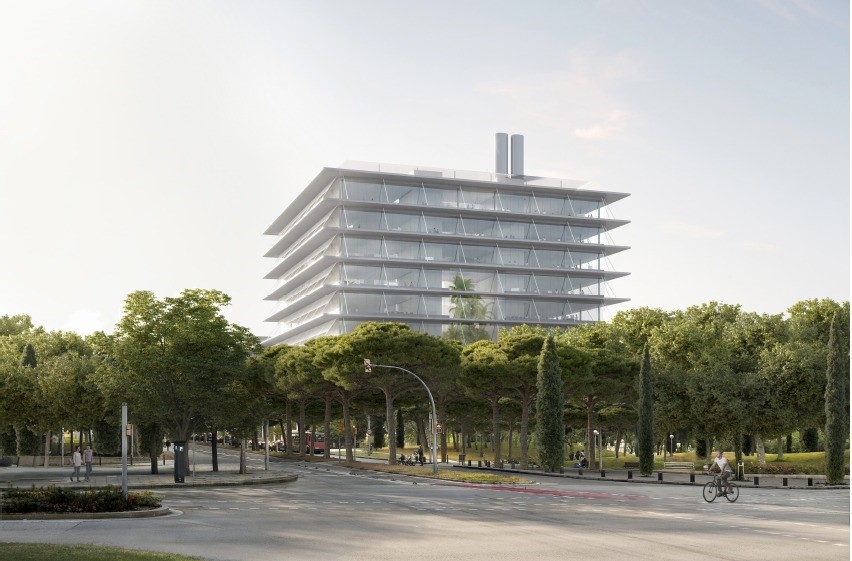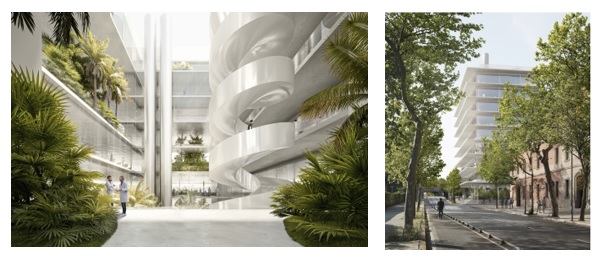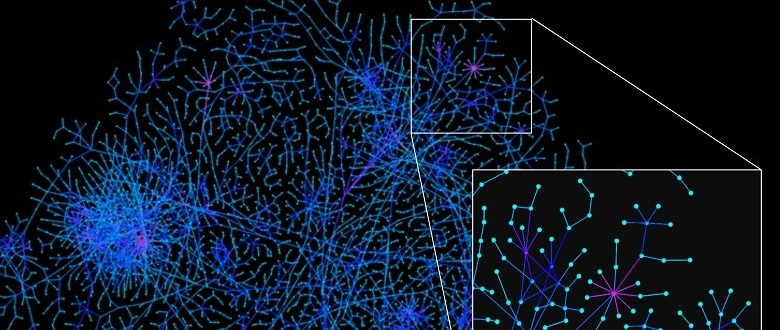The future building of the BIST at the old Fish market is starting to take shape
The construction of the new building, which will begin in 2022, launches the old Fish market multidisciplinary research hub, promoted by UPF, Barcelona City Council and the Generalitat (Government) of Catalonia under the ‘Citadel of Knowledge’ initiative

The Barcelona Institute of Science and Technology (BIST) has selected the Barcelona studio Barozzi Veiga to draft the basic and executive projects for its new building to be located on the grounds of the old Fish market, next to the Ciutadella Park. The BIST building, whose construction is scheduled to begin in 2022, is the first piece of the ambitious Citadel of Knowledge initiative, promoted by Barcelona City Council, the Catalan Government and Pompeu Fabra University to transform the Ciutadella Park area into a hub of research and innovation.
The jury of the BIST International Architecture Competition, chaired by Dr. Jordi Camí, director of the Barcelona Biomedical Research Park, with Oriol Clos Costa (architect), Beth Galí (architect appointed by the College of Architects of Catalonia), Xavier Matilla (chief architect of Barcelona City Council), Sito Alarcón (biologist), Ramon Sagarra (industrial engineer), and Margarida Corominas (doctor of Economics and manager of the IRB Barcelona), praised the solvency of the proposal and the fulfilment of all the requirements, both insofar as urban planning and with regard to its functional, economic and environmental aspects.

The jury also positively valued the quality of the proposal by the team of Moneo Brock/Baas/CasaSolo, which came second, for the effort to link the project with its surroundings and the organization of the ground floor, with an off-centre courtyard that enables generating different-sized spaces. The other three finalists were teams Pich-Aguilera/2BMFG Arquitectes/JC Ingenieros, BIG+IDOM, and Woods Bagot.
The winning studio was founded in 2004 in Barcelona by Fabrizzio Barozzi and Alberto Veiga and has received numerous awards including the Mies van der Rohe award for Contemporary Architecture in 2015 for the Szczecin Philharmonic Hall (Poland). In 2019 they were awarded the “Best Architects 20” prize and the Chicago Atheneum International Award for the Bündner Museum of Fine Arts in Chur (Switzerland). Other outstanding buildings by the studio that have received extensive international recognition are the Tanzhaus cultural centre in Zürich and the Cantonal Museum of Fine Arts in Lausanne. The BIST building will be the first to be built by the Barozzi Veiga team in Barcelona.
The new building, which will house more than 500 researchers and some sixty research groups from four BIST centres (CRG, IBEC, ICN2 and IRB Barcelona), will have a floor area of nearly 25,000 m2 spread over several storeys dedicated to multidisciplinary research. The works are endowed with an overall budget of 50 million euros.
The Citadel of Knowledge is starting to take shape
The new BIST building at the old Fish market complex is the first piece of the ambitious Citadel of Knowledge initiative, promoted by Barcelona City Council, the Generalitat (Government) of Catalonia and UPF to turn the surroundings of the Ciutadella Park, in the centre of Barcelona, into a benchmark urban hub of knowledge in southern Europe for biomedicine, biodiversity and planetary wellbeing. Last March, the Barcelona City Council Planning Committee approved the reform of the Urban Plan that allows the conversion of the land currently occupied by a parking lot, between Wellington and Sardenya streets and Avinguda Icària, into a research complex.
Related Assets
Four postdoctoral researchers will bring their talent to UPF thanks to the grants obtained in the European Marie Curie 2021 call
Four postdoctoral researchers will bring their talent to UPF thanks to the grants obtained in the European Marie Curie 2021 call
They will join the departments of Medicine and Life Sciences (Artemy Kolchinsky and Elena Muscolino), Humanities (Marija Blasokovic) and Information and Communication Technologies (Piotr Przybyla), under the supervision of senior UPF researchers, with stays of between two and two and a half years and grants in the region of 165,000 to 206,000 euros.

Four highly talented PhD researchers capable of making a positive impact on society and the economy, coming from various international universities, are to join UPF through grants obtained under the Marie Sklodowska-Curie Postdoctoral Fellowships (MSCA-PF) 2021 call, the first in the framework of the new Horizon Europe innovation and research programme (2021-2027).
Artemy Kolchinsky, Elena Muscolino, Marija Blaskovic and Piotr Przybyla will join three different UPF departments to conduct their research.
Two of them will be linked to the Department of Medicine and Life Sciences (MELIS): Artemy Kolchinsky, from the University of Tokyo, with the project “NETOLife: Nonequilibrium thermodynamics of the origin of life”, and Elena Muscolino, from the Leibniz Institute for Experimental Virology in Hamburg (with the project “EpiCoVs: The tRNA epitranscriptome: a novel player in viral infections”). They will be supervised, respectively, by Ricard Solé, ICREA research professor at the MELIS and director of the Complex Systems Laboratory (UPF and IBE) and Juana Díez, full professor and director of the Molecular Virology Laboratory of the MELIS. Both projects will run for two years and are endowed with grants of approximately 165,000 euros.
The other two fellows are on the one hand Marija Blaskovic, from the University of Vienna, who will conduct the project “FEMIber: Digitizing Women of Medieval Iberian Historiography”. She will join the Department of Humanities, under the supervision of María Morrás, a tenured lecturer of Spanish Literature and an expert on sexuality and gender, writers, female sanctity in the middle ages and at the beginning of the modern period. The project will run for two and a half years, and has been allocated around 206,000 euros.
On the other hand, Piotr Przybyla, from the Polish Academy of Sciences, will carry out the project “ERINIA: Evaluating the Robustness of Non-Credible Text Identification by Anticipating Adversarial Actions” at the DTIC. It will be supervised by Horacio Saggion, a member of the Natural Language Processing Research Group (TALN), where he directs the Large Scale Text Understanding Systems Lab, with a project running over two years and with funding of some 165,000 euros.
The Marie Sklodowska-Curie Postdoctoral Fellowships 2021, convened by the European Commission, have a total budget of 242 million euros and will help 1,156 experienced postdoctoral fellows, selected from a total of 8,356 applications.
Its objective is to increase the creative and innovative potential of researchers from around the world who have a doctorate and wish to acquire new skills and competences and develop their professional career through international mobility, while bringing their talent to the host institutions.
NETOLife: research on fundamental thermodynamic thresholds to help understand the origin of life
It has been suggested that the laws of thermodynamics can be used to study the origin of life, in terms of the minimum free energy flows needed to perform basic functions such as self-maintenance and self-replication. A theory that enables us to understand how life originated must be compatible with physics and at the same time include information, which plays a key role in biology.
This problem has not been explored largely because conventional thermodynamics is restricted to systems that are in equilibrium, on a macroscopic scale, and that do not exchange information with their environments. “The first living systems probably did not follow any of these principles, so this project proposes studying them through the thermodynamics of non-equilibrium, an area in which there have been huge advances recently. Through NETOLife we aim to shed light on fundamental thermodynamic thresholds, which will have important implications for our theoretical understanding of the origin of life”, Artemy Kolchinsky explains.
EpiCoVs: combining cell biology and molecular virology to study the behaviour of certain pathogenic viruses
Viruses are intracellular parasites that rely entirely on cellular machinery to generate their components and multiply. Therefore, given their great efficiency, it would be foreseeable that they would fully adapt to the cellular machinery. However, this is not the case for many pathogenic viruses, such as the emerging dengue (DENV), zika (ZIKV) or the new SARS-CoV-2 viruses, which, contrary to what would be expected, express their components at an extremely high level.
The team of scientists led by Juana Díez has identified a new mechanism whereby viruses induce an adaptation of the machinery of the infected cell to the characteristics of the viral genome in order to maximize the expression of viral proteins. Using SARS-CoV-2 as a model, the proposed project will combine cell biology and molecular virology approaches with “omics” analyses to molecularly characterize this new mechanism along with all the cellular and viral components involved. “In addition, the antiviral therapeutic interest of the enzymes identified will be explored with the ultimate goal of developing effective broad-spectrum antivirals”, Elena Muscolino explains.
FEMiber: exploring gender in the Iberian Peninsula during the Middle Ages through the creation of a digital database
The FEMIber project aims to study female representations in two medieval works: the “Chronicle of Castile” (Castile and Leon) and the Portuguese “Book of Genealogy” through digital humanities methods. Over two years, Marija Blaskovic will generate a digital prosopographic database (character description) of the women represented; she will explore the patterns and trends of the elements used by the socio-political and family orders in the two kingdoms through the gender perspective, and will carry out a six-month internship at the Madrid company DIGIBÍS, a pioneer in Spain in the digitization of heritage.
“FEMIber aims to explore gender during the Middle Ages in the Iberian Peninsula in a way that incorporates emerging technologies, while fostering lasting links with society and cultural heritage in general”, Marija Blasokovic sets out.
ERINA: evaluating the robustness of identifying fake news using natural language processing methods
Recent research has shown that state-of-the-art methods of artificial intelligence, especially natural language processing (NLP) and machine learning, can detect phenomena such as fake news, social media bots or the use of propaganda techniques. However, little attention has been paid to the robustness of these approaches, which is particularly important in the case of deliberate disinformation, as authors attempt to trick any automatic filtering algorithm to achieve their goals.
ERINA will use methods that cause small disturbances to a given piece of text, so that its meaning is preserved, but which imply that the output of the investigated classifier is inverted. “The aim of the project is to explore the robustness of text classifiers in this area of application by investigating methods for detecting disinformation through contradictory examples”, Piotr Przybyla outlines.



